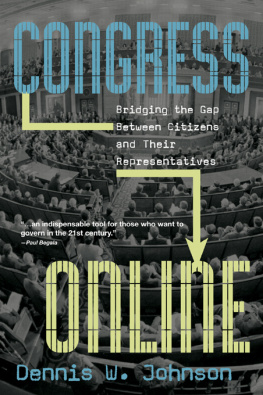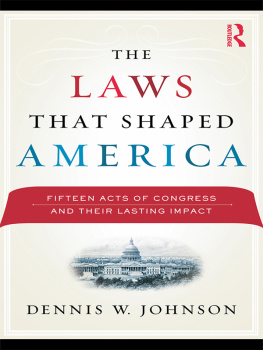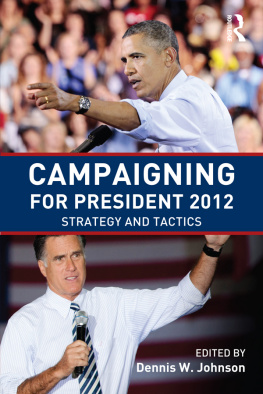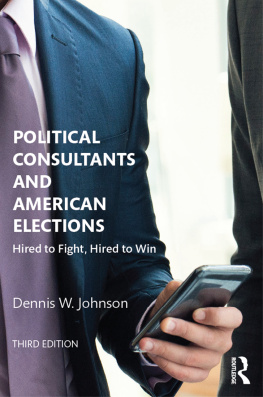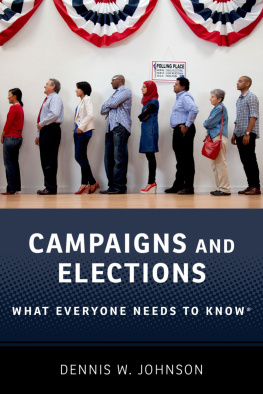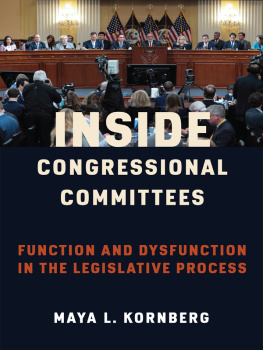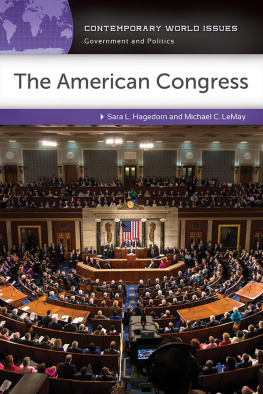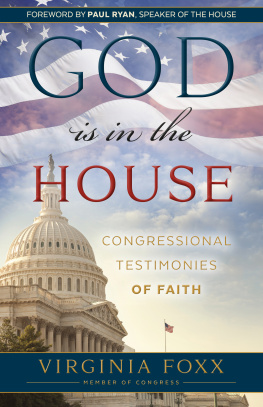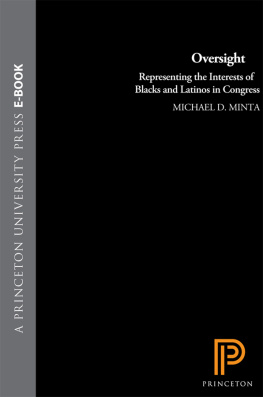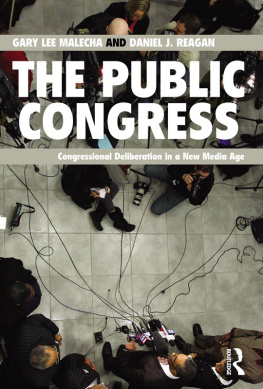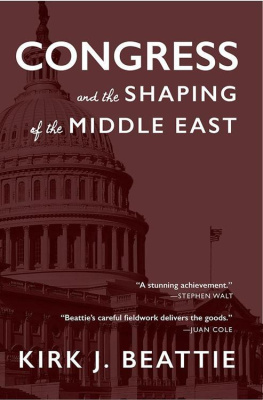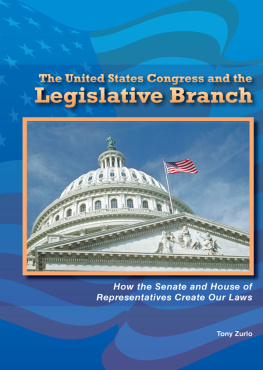COnGRESS OnLInE
COnGRESS OnLInE
Bridging the Gap Between Citizens and Their Representatives
Dennis W.Johnson
ROUTLEDGE
NEW YORK AND LONDON
Published in 2004 by
Routledge
29 West 35th Street
New York, NY 10001
www.routledge-ny.com
This edition published in the Taylor & Francis e-Library, 2005.
To purchase your own copy of this or any of Taylor & Francis or Routledges collection of thousands of eBooks please go to www.eBookstore.tandf.co.uk .
Published in Great Britain by
Routledge
11 New Fetter Lane
London EC4P 4EE
www.routledge.co.uk
Copyright 2004 by Taylor and Francis Books, Inc.
10 9 8 7 6 5 4 3 2 1
All rights reserved. No part of this book may be reprinted or utilized in any form or by any electronic, mechanical or other means, now known or hereafter invented, including photocopying and recording, or in any information storage or retrieval system, without permission in writing from the publisher.
Library of Congress Cataloging-in-Publication Data
Johnson, Dennis W.
Congress online: bridging the gap between citizens and their representatives/
by Dennis W.Johnson.
p. cm.
Includes bibliographical references and index.
ISBN 0-415-94684-0 (Print Edition) (cloth: alk. paper)ISBN 0-415-94685-9 (pbk.: alk. paper) 1. United States. CongressConstituent communication. 2. United States. CongressInformation resources management. 3. LegislatorsUnited StatesComputer network resources. 4. Electronic mail messagesUnited States. I. Title.
JK1131.J64 2004
328.73'0731'02854678dc22
2003022819
ISBN 0-203-49403-2 Master e-book ISBN
ISBN 0-203-57743-4 (Adobe eReader Format)
To Linda, with all my love.
CONTENTS
Acknowledgments
This book is one of the research products of the Congress Online Project, a collaboration between The George Washington University and the Congressional Management Foundation. For the past two years, I have had the privilege of serving as principal investigator for this project, which was funded by a generous grant from The Pew Charitable Trusts. Thanks to the foresight and vision of Rebecca Rimel, president, Michael Delli Carpini, Elaine Casey, Sean Treglia, and the board of trustees of The Pew Charitable Trusts, this project was developed and sustained. Through its two major annual reports, issue briefs, electronic newsletters, and technical assistance, the Congress Online Project has made an important impact on the way Members of Congress communicate with citizens in this emerging era of electronic communications.
Special thanks to my colleagues and partners at the Congressional Management Foundation: Richard Shapiro, executive director; Kathy Goldschmidt, project manager; Mike Callahan; Nicole Folk; and Brad Fitch. I benefited enormously from their insights and from the pleasure of our collaborative work on this project. From The George Washington University, I especially thank Christopher Arterton, dean, Graduate School of Political Management, for encouraging me to assume the role of principal investigator. My thanks also go to my colleagues: Carol Darr, director of the Institute for Politics, Democracy, and the Internet, and Michael Cornfield, research director; my talented research assistants, Lisa Butenhoff, Greg Talmage, and Ryan Waite; and to Rosita Thomas of Thomas Opinion Research.
Thanks to those individuals who read parts, or all, of this manuscript, who gave me sound advice, and helped make this a better book in the process: Chris Casey, Michael Cornfield, Charles Cushman, Carol Darr, Kathy Goldschmidt, Max Fose, Stephen Frantzich, Eric Petersen, Jeffrey Seifert, and Jonah Seiger.
This work would not have been possible without the assistance of Members of Congress who consented to be interviewed, their staff, and individuals in key technology and administrative roles. Many of the staffers were interviewed under the condition of anonymity.
Also of assistance for our overall project were technology experts in the private sector, especially John Aravosis, Graeme Browning, Janet Caldow, Max Fose, Kathy McShea, Chris Porter, Joiwind Ronen, John Sampson, and James Vaughn.
My special thanks to Rob Tempio, Angela Chnapko, Nicole Ellis, and Kathleen King at Routledge and to Eric Nelson.
Most important, my special thanks go to my wife, Linda, who, as usual, has sustained me throughout the long days of research and writing.
Dennis W.Johnson
Washington, D.C.
List of Tables
Introduction
Your votes and speeches may make you well known and give you a reputation, but its the way you handle the mail that determines your re-election.
Speaker of the House William B.Bankhead (1938)
In the early 1930s, life on Capitol Hill was slow-paced and unhurried. The House Office Building (now the Cannon Building) was the home of all the Representatives, each tucked away in one-room offices. In those days, congressional offices opened around 9:00 a.m. and closed at 4:00 or 4:30 in the afternoon. Visitors from back home were rare and sessions were relatively short, with Congress convening on March 4th and adjourning within four months, usually by July 4th. Air conditioning had just been installed in the House and Senate, but during the long, sultry days of late summer, official Washington resembled a languid ghost town.
Members of Congress each had a clerk-hire budget of $5,000, allowing them to employ two secretaries. One estimate had it that more than half the offices hired just one secretary and paid the rest to a relative who never bothered to show up for work. Communications with folks back in the district were limited. Long distance telephone calls were prohibitively expensive; telegrams were rare and only for emergencies. Letters and penny post cards were the usual way citizens communicated with their lawmakers in Washington. The amount of mail varied from office to office, but typically, in a rural, western district, there would be no more than ten to fifteen letters a day, mostly from job-seekers or veterans looking for federal pensions.
It was different, however, in the congressional office for the Fourteenth District of Texas. The Congressman was Richard Kleberg, a wealthy playboy who cared little about legislating and less about opening and answering constituent mail; but his energetic young secretary, Lyndon Johnson, minded very much. Johnson was a cultural and social naif when he arrived in Washington as a twenty-three-year-old aide, but he knew his politics. He knew that constituent mail was the life-connecting force with folks back home, especially those who lived some 2,000 miles away and could only afford to communicate through the mail. As the Depression gripped more people in economic desperation, they turned to Washington and to their Representatives for help. They wrote letters, many with plaintive hand-written requests for assistance or reassurance; more often than not, however, there was no help to give.
The Kleberg office saw its share of heart-tugging letters; no matter how desperate or futile a request might be, Johnson insisted that the two office clerks answer each letter the day it arrived. When things got quiet, young Johnson insisted that the Kleberg office send unsolicited letters of praise, congratulations, and condolences to Texas constituents. He carefully read every newspaper in the district and put a check mark beside the names of people who had celebrated anniversaries, retired from their jobs, lost loved ones, or These, after all, were letters all the way from Washington, sent from their Member of Congress on fancy embossed stationery, many to be framed and hung proudly on the living room or office wall.

